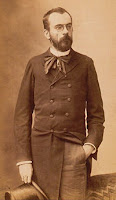from the group, Marschnerites:Richard Franklin writes:
"Quiz: What do the composers Marschner, Humperdink, Schoenberg Berg, Schrecker, and Weill have in common? Answer: Sprechstimme! To my knowledge and experience the first time Sprechstimme was employed was in the remarkable monologue of Gertrud (Act II, scene II of Hans Heiling, 1833). The monologue starts spoken (gesprochen in the stage directions) and then alternates between sung and spoken monologue - a truly electrifying moment in operatic history.
This is a very interesting question, and one that I have often thought about in a different context. Surely words have been accompanied by music from time immemorial -- think of the Roman orators and the Beowulf poet, who spoke rhythmically, with a lyre or lute to keep them on pitch, even though this was not singing. Surely in the theater people spoke lines with music we'd now call 'background music' or even 'underscoring' (as the movies call it). That isn't sprechstimme, because Sprechstimme is a term used by Schoenberg in his
Pierrot Lunaire -- and he may not have invented the term. But he has two paragraphs that explain in excruciating detail what he means by it, and it isn't easy to do! He wants the natural vowel of each syllable to be on the pitch designated, but not held, as you would in singing. (You try it).
However, if you listen to Pierrot Lunaire, and there are many interpretations as to how to do this, it does *not* sound like speaking at all, but *does* sound like an actor who is trying to hang his words onto pitches for the sake of having them carry in an auditorium. take a look at how it's notated:

Each note has a little "X" through it, but the pitches are excruciatingly precise.

A neophyte performer is utterly terrified that this is just not possible to do. It is a request that is totally new from a composer to a singer - way beyond simple speech. BTW, the notation for "halbgesungen," or half-singing, is a slash through each note (how exactly one does this isn't stated), and for rhythmic speech with no pitch desired there are a number of notations, from simply writing the words with no noteheads at all, empty flags with no heads, and notes with the blank "x" again as the heads.
Schoenberg also wrote Moses und Aron with Moses in this same speech manner. You can't be merely an actor to do this - you really have to be a musician and a singer, because of the rhythmic difficulties and the true interconnection with the orchestra and the rest of the ensemble. In his Die Glückliche Hand the protagonist does much of the same, but it's closer to singing, as in Ewartung.
In Lulu and Wozzeck, Alban Berg's score is very, very explicitly written for all kinds of declamation - sung, half-sung, sprechstimme, spoken; he refers to Schoenberg and his intro to P. Lunaire, calling it "Rhythmic Declamation".
However, between these two extremes (the random speech with music under it, up to Schoenberg's 'Sprechstimme'), there is a halfway ground, and this is what I was interested in.
There were, in those days before radio and TV, amusements at home and in the salon, where one would hear singers and pianists, etc. But at times there were enthusiasts who could not sing, and several very interesting pieces were written for speaker and soloist (piano) under it, with a very definite one-to-one correspondence, measure by measure, as to what was played and what was spoken. No less than Franz Liszt wrote several of these recitations, one being Lenore that Dietrich Fisher-Dieskau has recorded. There are many others out there, and I have begun collecting them. I have about 7 - even Richard Strauss wrote one.
 I do agree that the Hans Heiling scene is chilling, and one reason for it is the spoken vs. sung text; the other is the scoring, for contrabass But it isn't Sprechstimme, it's simply spoken, rather like the recitation in the Liszt piece, known as "melodram". You can see the score to Lenore, one of Liszt's melodrams here.
I do agree that the Hans Heiling scene is chilling, and one reason for it is the spoken vs. sung text; the other is the scoring, for contrabass But it isn't Sprechstimme, it's simply spoken, rather like the recitation in the Liszt piece, known as "melodram". You can see the score to Lenore, one of Liszt's melodrams here.
When Rex Harrison was cast as Henry Higgins, he was despondent that he couldn't sing the part, and Fritz Loewe told him how he could do it in a Sprechstimme manner; and yes, that is rather how Lotte Lenya got away with most of her roles, even though Weill wrote them out completely, to be sung by other artists differently. Weill never really wrote Sprechstimme either - but in performance sometimes it comes out rather like that.











 There it was, Tiefland,
There it was, Tiefland,





 Giulietta Simionato
Giulietta Simionato